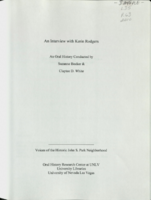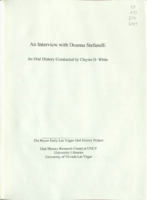Search the Special Collections and Archives Portal
Search Results

Transcript of interview with Sonja Saltman by Barbara Tabach, August 18, 2015
Date
Archival Collection
Description
Included in this oral history are reminiscences of Sonja Saltman's personal non-Jewish heritage in Austria, the importance of her grandmother in her life, and how she recalls becoming part of the Jewish community.
Sonja Saltman is a psychologist and philanthropist in Las Vegas, Nevada. She is executive director and co-founder of the Existential Humanistic Institute, a non-profit organization based in San Francisco, California that offers training in existential-humanistic therapy and theory. In 2003 Sonja and her husband Michael Saltman founded the Saltman Center for Conflict Resolution at the University of Nevada, Las Vegas (UNLV) William S. Boyd School of Law. The Saltman Center is focused on research, teaching, and public service related to "the advanced study of the nature of conflict and how to resolve it." A native of Austria, Sonja Saltman also serves as the Honorary Consul for Austria in Las Vegas. The Saltmans are involved with multiple charitable organizations and initiatives, both locally and abroad. Sonja Saltman has served on the boards of the Anti-Defamation League, Nevada Women's Philanthropy, and the Black Mountain Institute. Projects that the couple has supported include the rebuilding of homes and bridges is Bosnia, and Streetball Hafla, a basketball program to improve relations between Jewish and Arab teenagers in Israel. In 2014 Sonja and Michael Saltman were recognized as Distinguished Nevadans by the Nevada System of Higher Education. Included in this oral history are reminiscences of her personal non-Jewish heritage in Austrian, the importance of her grandmother in her life, and how she recalls becoming part of the Jewish community.
Text

Transcript of interview with John Wanderer by Barbara Tabach, May 9, 2016 and May 18, 2016
Date
Archival Collection
Description
In this interview, Wanderer talks about his first career in auto mechanics and car racing, which developed out of a childhood passion, and eventually took him to Charlotte, North Carolina working for Holman and Moody. He then discusses the decision to move back to Las Vegas with wife, Dorothy (Dottie), to pursue his legal career. Wanderer reflects at length about his mother?s trailblazing legal career, and working with her as legal partners. In addition, Wanderer discusses politics, including his observations from the 2016 Democratic State Convention and running for Democratic Party National Committeeman.
Text

Transcript of interview with Oscar Goodman by Claytee D. White November 10, 2014
Date
Archival Collection
Description
Oscar Baylin Goodman (1939- ) is the former mayor of the city of Las Vegas, Nevada, serving 12 years until 2011, when he swore in his wife of over 50 years, Carolyn Goodman. Oscar Goodman is the official ambassador of Las Vegas, and the chairman of the Las Vegas Convention and Visitors Authority (LVCVA) Host Committee. He is also known as one of the best criminal defense attorneys in the United States, and spent 35 years defending alleged Mob figures such as Meyer Lansky, Frank Rosenthal, and Anthony Spilotro. Goodman is the primary visionary and a member of the board of directors of The Mob Museum in downtown Las Vegas, which opened in 2012. Goodman was born June 26, 1939 in Philadelphia, Pennsylvania. He earned his undergraduate degree from Haverford College in 1961 and his law degree from the University of Pennsylvania Law School in 1964. That same year he moved to Las Vegas and in 1965 he was admitted to the Nevada State Bar. He served as Clark County?s chief deputy public defender from 1966 to 1967. Goodman was elected as mayor of Las Vegas for the first time in 1999. During his three terms (the legal limit), he contributed to the economic and cultural development of the downtown area by supporting projects such as the arts district and Union Park, a high-rise residential and business project he helped to secure 61 acres of land for. He helped to begin what he called the ?Manhattanization? of downtown, which included the construction of taller buildings for better use of the area?s prime real estate. In this interview, Goodman discusses the role of Judaism in his life, from childhood to adulthood to parenting his own four children. He touches on his involvement with Temple Beth Sholom, including serving as its president, as well as in local development projects like the Lou Ruvo Cleveland Clinic Brain Health Center, Smith Center for the Performing Arts, and Mob Museum. In addition, Goodman discusses the impact of Jewish residents on the city and its development, and mentions leaders in the gaming industry, legal profession and in politics.
Text

Transcript of interview with Walter John Ritzau by Elizabeth Garrison, February 25, 1977
Date
Archival Collection
Description
On February 25, 1977, Walter John Ritzau interviewed Elizabeth Schneehagen Garrison (born 1943 in Las Vegas, Nevada) about her life in Southern Nevada. Garrison first talks about her schooling in Las Vegas and her first homes in Las Vegas. She also discusses the atomic testing, the Devils Hole in Ash Meadows, early church involvement, recreational activities, and some of the environmental aspects of Las Vegas. Garrison later describes her work for the Central Telephone Company before describing the Helldorado parade and some of the early activities designed for children. In the latter part of the interview, she describes her father’s garden, the changes in the city environment and building, shopping locations, and more about her home life.
Text

Transcript of interview with Judith L. Hamblin by Margaret Stambro, March 30, 1976
Date
Archival Collection
Description
On March 30, 1976, collector Margaret Stambro interviewed schoolteacher and registered medical stenographer, Judith L. Hamblin (born June 11, 1941 in Las Vegas, Nevada) in her home in Henderson, Nevada. This interview covers the history of Henderson, local schools and teachers, and Helldorado. Also during this interview, Mrs. Hamblin discusses her fondness for Lake Mead, the Basic Magnesium Plant, Nellis Air Force Base, and the early aboveground atomic blasts.
Text

Transcript of interview with Kerin Scianna Rodgers by Suzanne Becker and Claytee D. White, February 7, 2009 and August 11 & 16, 2011
Date
Archival Collection
Description
Kerin Rodgers was born in 1936. She recounts her family history and stories of her youth growing up in Boston, MA, and shares how the family relocated to Seattle, WA in the mid-1940s. She talks about her enjoyment of theatrical arts and politics, and about being a resourceful divorced, single-mom and entrepreneur. In 1958 she opened a retail fashion store and modeling agency with a friend in Santa Monica, CA. Kerin had a knack for fashion and interior design that would assist her then and into the future. She also shares the story of arriving in Las Vegas as part of retail job with The Broadway stores in 1966—a two-week stint that seemed to have no ending. Her transition into Las Vegas included remarriage, a 1974 Keno win that enabled her to put down money on a home ( a house built by Paul Huffey) in the John S. Park neighborhood, and making close friends in the community. Her interview is sprinkled with tales of activities and personalities from the neighborhood's past and present. Kerin was involved with the Focus Youth House, speaks about First Fridays and art, as well as gives a perspective of police, criminal behaviors and changes in the neighborhood over the years. She hosted a local television show and enjoyed being a community activist.
Text

Transcript of interview with Deanna Stefanelli by Claytee White, May 3, 2010
Date
Archival Collection
Description
Deanna Stefanelli and her family moved to Las Vegas when her husband John Stefanelli accepted a position as a professor in Food and Beverage at UNLV. She took a part-time job in the admin office of the university's library in 1981. It was also an ideal time for her to return to college to finish her degree. Eventually she became full-time and enjoyed the growth and change of UNLV and the library. Deanna recalls the physical and personnel changes of the library. She describes some of the fun activities that kept them a close work community—from the Friends of the Library to book sales and pancake breakfasts, to a newsletter and learning to make sushi with Myoung-ja Kwon.
Text

Mary Leo interview, February 27, 1980: transcript
Date
Archival Collection
Description
On February 27, 1980, Rafael Reyes-Spindola interviewed Mary Leo (b. Mary Susanne Kaime Leo in 1949 in Santa Barbara, California) about her life growing up in the Las Vegas Valley and her varied career path. Leo, having moved to Las Vegas as a toddler, talks about what the city was like when she arrived, the landscape, schooling and local life in general. She remembers the construction of the University of Las Vegas, Nevada and the growth of the city and population. Through her anecdotes, Leo shares the local attitude towards the Strip that Las Vegans develop as a result of being raised in the city and focuses the beginning half of her interview on life outside of the Strip. The interviewer and Leo move their conversation towards her career path, beginning in a coffee shop at the Riviera Hotel & Casino, her time in the travel industry, as a Las Vegas showgirl in the famed Folies Bergere show, her return to the Riviera as the director of sales and catering, and the legacy she hopes to leave behind with her career.
Text

Transcript of interview with Jack Levine by Suzanne Becker, June 28, 2007
Date
Archival Collection
Description
Jack LeVine offers a narrative as a real estate agent and a gay man who has lived in Las Vegas since he was a young adult in the 1980s. He first started visiting Las Vegas whenever his truck driver routes allowed him to visit his parents who had moved here in 1977. They owned a downtown sandwich and catering business called Your Place or Mine. Then in 1985 Jack and his life-partner, J.J., decided to relocate to Las Vegas. Jack soon launched a real estate career that began with the purchase of a 13-unit apartment complex. Over the years he became knowledgeable about the history of the greater community and the individual neighborhoods; including John S. Park—"the earliest suburb in Las Vegas. Jack and J.J have lived in a 1954 Mid-Century Modern home since the mid-1990s. Jack is a strong believer in re-gentrification and mentions other cities where this has been successful. His philosophy includes an explanation of the sense of community that is derived from those who invest of themselves in that community life John S. Park.
Text

Joseph C. Mattingly interview, February 23, 1979: transcript
Date
Archival Collection
Description
On February 23, 1979, collector Sean Powers interviewed Joseph C. Mattingly (born April 21st, 1912 in Texas) at his home in Las Vegas, Nevada. In this interview, Mr. Mattingly discusses working construction on many buildings in the Las Vegas and Henderson areas in Nevada. He also talks about being a member of a motorcycle club and about air conditioning in the early days.
Text
